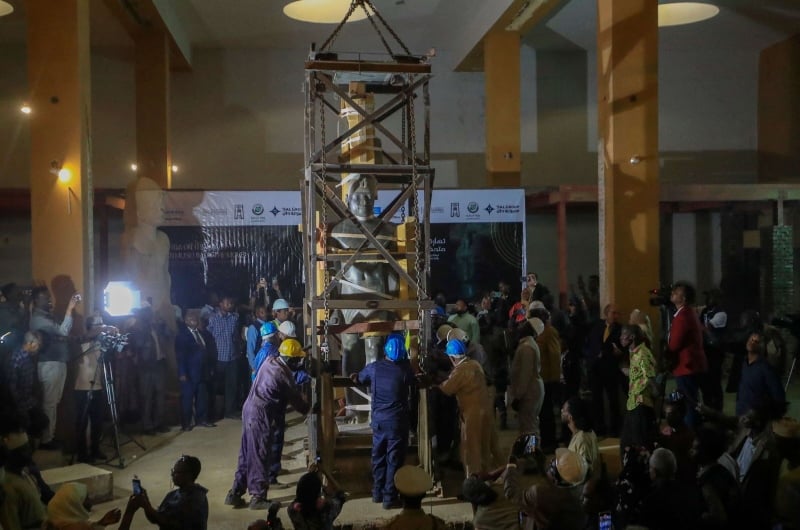PORT SUDAN: The devastating war in Sudan, which has been going on for more than 17 months, has reached looted museums and artifacts that are being sold online, worrying researchers and international organizations.
The United Nations Educational, Scientific and Cultural Organization (UNESCO) warned Thursday that “the threat to culture (in Sudan) has reached an unprecedented level in recent weeks, especially in light of reports of looting of museums, heritage and archaeological sites and private collections.”
Ikhlas Abdel Latif, director of museums at the National Authority for Antiquities and head of the Sudanese Antiquities Recovery Committee, said: “Yes, the National Museum of Sudan was subjected to a major looting.”

she added that satellite monitoring “the exit of large trucks loaded with all the artifacts stored in the museum through Omdurman heading towards the west”.
The loot is sold in border areas, especially on the border with South Sudan.
Fighting erupted in Sudan in April 2023 between the army led by Abdel Fattah al-Burhan and the Rapid Support Forces led by his former deputy Mohamed Hamdan Dagalo, plunging the country into what the United Nations described as “one of the worst humanitarian crises in modern memory.”
The size or value of the loot was not immediately clear because officials had difficulty gaining access to the museum, which is located in the RSF-controlled area. Abdul Latif says the National Museum’s warehouses “are a major repository for all Sudan’s antiquities”.
Opened in 1971, the National Museum is located in the capital and its entrance overlooks the bank of the Blue Nile, and includes collectibles and pieces dating all periods of Sudanese civilization, from the Stone Ages to the Islamic period through Nubian and Christian monuments.

One of the reasons for the museum was to save artifacts and remains of some temples, whether from the Nubian or ancient Egyptian civilizations, from being submerged during the construction of the Aswan High Dam in southern Egypt.
Sell online
Over the past few days, many Sudanese have circulated on social media platforms an advertisement quoting the e-commerce site “eBay” for the sale of a piece of three statues on one pedestal (a man, a woman and a child) and written on it that it is an ancient Egyptian artifact for sale at a price of $ 280.
They denounced the sale of Sudan’s heritage online, but one Sudanese archaeologist, who asked not to be named, said that “the statue displayed (online) is an imitation of a piece in the museum.”
However, he noted that there are advertisements for “pottery and gold pieces and paintings that were in the museum” on sale online.
“There are concerns that if museum robbers try to move the huge statues they could be destroyed because they need specialists.”
UNESCO called on the Sudanese “from the public and the artistic community… in the region and the world to refrain from trading in Sudanese art pieces.
Closed since 2020
In 2020, the Sudanese government closed the museum for maintenance, and it remained closed until the authorities succeeded in early 2023 – three months before the war – in moving the statue of King Tarhaga from the entrance to the museum with the help of a specialized Italian team.
Tarhaga is the fifth king of the Kingdom of Kush, as Sudan was called in ancient times, and ruled it about 2,700 years ago.
However, the museum did not reopen due to the outbreak of fighting.
In June, UNESCO confirmed that “more than a dozen museums, cultural centres and institutions of memory have been looted and vandalized” in Sudan.
She warned of the loss of “the memory of thousands of years of indigenous civilization, knowledge and traditions in the country”.
The looting of heritage did not stop at the National Museum. “The property of the Nyala Museum in South Darfur, its museum collections and even display tools were looted,” Abdellatif said.
She also referred to the theft of the Caliph Abdullah al-Ta’ayshi museum in Omdurman, and the destruction of parts of its building, which dates back to the Mahdist era in Sudan before independence.
Hassan Hussein, a researcher in Sudanese antiquities and former director of the Antiquities Authority, attributed the reason for the thefts to the fact that “there is no guarding of Sudanese museums and antiquities because of the war.”
Archaeologists have launched a campaign to recover looted Sudanese artifacts. Hussein said he was seeking to shed light on the crisis of stealing Sudan’s history at a conference in the German city of Münster.
“The situation of Sudanese antiquities at the present time concerns all those interested in human heritage,” he said.
(AFP)

